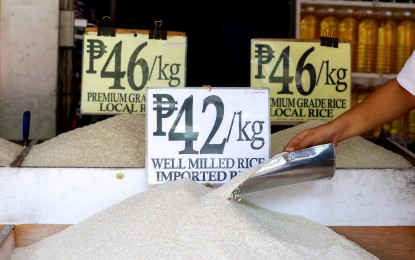
STAPLE. Local and imported rice retail for PHP46 and PHP42 per kilo, respectively, at a store inside the San Andres Market in Manila on June 26, 2023. President Ferdinand R. Marcos Jr., who concurrently serves as head of the Department of Agriculture, earlier expressed confidence that the goals set for the development of the sector are attainable while they address pressing issues such as decreasing productivity, climate change, diminishing natural resources, and changes in market trends. (PNA photo by Yancy Lim)
MANILA – Senator Grace Poe on Wednesday urged the national government to brace for the recent rice export ban imposed by India.
In a statement, Poe said the ban, which could further increase global and local food prices, was unfortunate coming at a time when hectares of rice fields in the Philippines were flooded due to typhoons and monsoon conditions.
"Hindi naman natin masisisi ang India sa kanilang desisyon. May obligasyon silang unahin ang kapakanan ng kanilang 1.4 billion na mamamayan (We can't blame India for their decision. They have the obligation to prioritize the welfare of their 1.4 billion citizens)," Poe said.
"Ngunit, may obligasyon rin tayo sa 113 milyon na mga Pilipino, lalo na sa 3.4 milyon na mga kabataan at mag-aaral na umaasa sa Feeding Program ng gobyerno. Kapag sila ay nagkulang sa timbang, tayo ang may pagkukulang (But we also have the obligation to 113 million Filipinos. Especially to the 3.4 million children and students who depend on the Feeding Program of the government. If they lose weight, it will be our shortcoming)," she added.
India, the world's largest rice exporter, announced on July 20 its ban on non-basmati white rice exports to stem domestic inflation.
Filipinos, Poe noted, consume 118.81 kilograms or two sacks of rice each on the average a year and also cited a report from the Philippine Statistics Authority that the Philippines is only 81.5 percent rice self-sufficient.
"The reasons for such high import dependence are too many to discuss here. Simply put, our agriculture sector is not blessed with either good geography or good governance," Poe said.
The senator said the country imported 3.79 million metric tons (MT) of rice last year, including 3.16 million MT sourced from Vietnam and 10,045 MT from India.
"But this does not exclude us from the collateral impact of their (India) decision. The decline in global supply from the biggest rice exporter is expected to cause a spike in global rice prices because of speculation," she said.
According to data gathered by her office, Poe said non-basmati rice accounts for roughly 81.2 percent of India’s total rice exports, the category subject to the ban.
"This means that in one fell swoop, India has created a 17.86 million MT shortage in the global rice market. Those who will fill that gap can certainly charge a premium," she said.
She pointed out that Vietnam, which supplies more than 90 percent of the Philippines’ rice imports, increased its price to USD600 per MT compared to the previous USD500 per MT.
Poe vowed to scrutinize the 2024 budget that the Department of Agriculture will propose hoping that it will not only increase, but will also be spent faster on the things that matter the most for Filipino farmers. (PNA)
